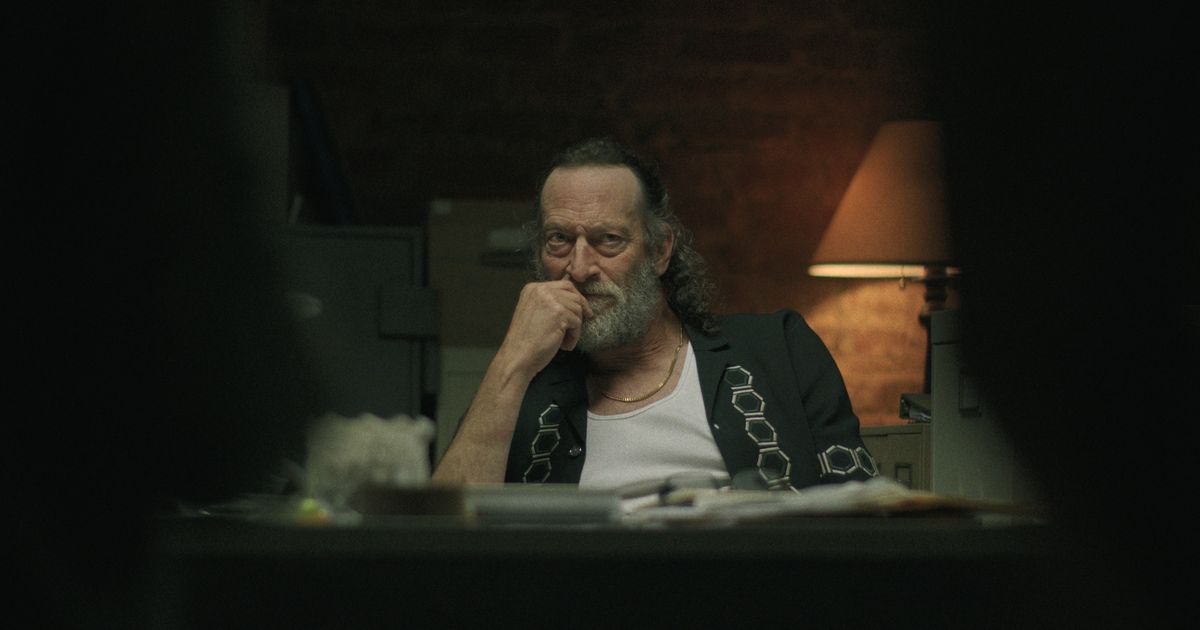
Sweaty’s Not a Good Look for You
Season 1
Episode 2
Editor’s Rating
3 stars
***
It’s fun to watch Vince run around town trying to collect enough money to pay his debts … until it isn’t.
Photo: Netflix
The Black Rabbit was never Jake Friedken’s dream, but it ended up seducing him anyway. An older brother’s demands will do that. Black Rabbit’s second episode trades the introductory flash-forward for a classic flashback, set in motion by a slightly less unkempt Vince, now sporting a mullet and handlebar mustache in place of his twitchy Manson look from the present timeline. “Restaurants are the nightclubs for adults,” he tells a befuddled Jake. Funny, I thought nightclubs were the nightclubs for adults, but I get the vision here. So does Jake, though he isn’t exactly jumping at the chance to leave his job as Wes’s manager for a precarious new venture. But Vince starts talking open concepts and VIP rooms and “having something that’s our own again, ours together, you and me,” and that’s when you can see Jake submitting to the terrible whirlwind into which this whole thing will inevitably spin down the line.
The first two episodes of Black Rabbit feel very much like a two-part premiere, and in that time Bateman and Law succeed in overcoming their surface-level “miscasting” as brothers by delivering strong performances that fill out their shared, corrupted interiority.
Cut back to the present, where Jake has brought his absent older brother’s dream to fruition. The gang is toasting to their glowing New York Times review, coining the Black Rabbit as the hottest night spot in town, recalling “the decadent court of Mick Jagger and his jesters.” Sort of a boomerish reference for like a 2011 sneaker-ad-lookin’-ass joint owned by a failed 50-year-old Gen-X musician. Then again, it’s exactly the kind of missive Vince would have dreamed of when he first hatched the scheme for this place.
“So, ready for our second album?” Jake poses to Roxy and Estelle as if the new Pool Room venture is theirs for the making when it’s really his. I’m sure there are plenty of CEOs out there who love to think of themselves as “just part of the team” until this is actual work to be done or sacrifices to be made — whether the chips are down or up, these types of guys enter and exit the game as solo players. All Jake has ever shared is the mess his brother left in his wake, and the Pool Room is his second album alone.
Jake is 50 years old, and as he tells Estelle while showing off the Four Seasons Pool Room, he doesn’t want to close a bar every day until he dies. Look, we’re all surprised that Jude Law is 50, but I’m not sure I’m buying how attractive and endearing Estelle seems to find that comment. But Jake also appeals very quickly to Estelle’s sense of purpose, insisting he needs her to do the redesign, catching her as she’s reconsidering her relationship with Wes. These days, Wes is riding his own high wave of success, with little interest in Estelle’s life beyond being his girlfriend. It’s a slightly underbaked rift to get a love triangle going between these three buddies, but it does present another inevitable consequence of a world where money and success leave little room for meaningful connections.
But we have schemes to get to, and the brothers Friedken find their separate plans foiled when they find out their mom’s house isn’t going to turn the $300,000 profit they were expecting. Vince lets it slip that he’s “dead” without that chunk of change coming in, then bolts to make a quick buck the old-fashioned way: at a high-roller’s private game tucked away in the corner of some big office tower after hours. Meanwhile, Jake sees a new, rather unfriendly social media post from Anna about the Times review, and comes up against a complete wall when he asks Val for a loan at their kid’s back-to-school night. One of the richest deadbeat dad-ass moves I’ve ever seen, man. No surprise, given how much Jake sounds like Vince when he says getting the Pool Room would “double his income overnight.” “This is a real shot for me not to be the last guy standing at the party every night,” he tries to reason with Val. Are promises empty if the person making the empty promise believes their own bullshit?
Our introduction to Joe Mancuso is a prime example of Black Rabbit’s split difference between Netflix slop and Sunday-night HBO fare. Forrest Webber is certainly delivering the goods as Junior, to the point of cutting a cartoonish, Sopranos-fanfic-like figure. But the low-rent Scorsesean descent into his father’s office in the bowels of a bathhouse hits like the low-rent noir it is, and deaf actor Troy Kotsur’s casting as big papa Joe is a mini-revelation for the show. Again, the conversation here is standard gangster stuff: Junior leaned on Vince even though Joe decreed the Friedken’s off limits, and protests he did so to start “building his own book” like a big grown-up mob boss, but Joe leaves no room for the tough-guy cosplay and cuts him down to size with a white-hot glance.
Unfortunately, $140,000 is a tab too high to leave unpaid. To maintain the integrity of the house, the dealer must extract payment, and loudly. Junior and Babbitt get an obscured (for now) tip on Vince’s whereabouts, and track him down just as he’s getting belligerent at the blackjack tables. Another great scene for Bateman to weave the self-imposed degeneracy of the character into his sarcastic, fast-talking, nervous persona. Again, Bateman also makes a fun little chase of this otherwise uninteresting location, ending in the elevator where Junior catches up to Jake, cuts his pinky off, and threatens to hurt his daughter Gen next.
As is the Friedken way, Vince hides the whole truth until the moment he absolutely has to lay it on the table. Fresh out of quick-cash options, he confesses the whole deal to Jake: He owes $140,000 to Junior like, yesterday, and now Gen’s life is on the line. But Jake’s hands are tied to holding Vince’s through another tough spot, so he goes to Mancuso to make a reasonable deal: $20,000 a week until the debt is paid. Junior is disappointed, having hoped to humiliate the Friedkens in a more dramatic fashion, but Joe is just fine with it. But the elder Mancuso adds a big old caveat: One missed payment and the Black Rabbit is his. Jake protests with a hint of arrogance that crosses a line with Joe, and he reacts by sliding a hot coffee mug into Jake’s lap. Again, it’s menacing scenes like this where Kotsur proves a recurring highlight of the series.
With the first payment due in four days instead of a full week and a deficit of cash flow looming over them, the Friedken brothers find themselves even more in the red than they realize. At Jake’s insistence, Roxy reaches out to Anna to talk through her firing and subsequent post. When she hears Anna’s story of being drugged and waking up in the VIP bathroom hours later, Roxy vows to “have Anna’s back” and “take these guys down,” but they both know there was no having anyone else’s back from the beginning. Turning a blind eye is a presetting — the ante you pay before the cards are even dealt.
VULTURE NEWSLETTER
Keep up with all the drama of your favorite shows!
Vox Media, LLC Terms and Privacy Notice

